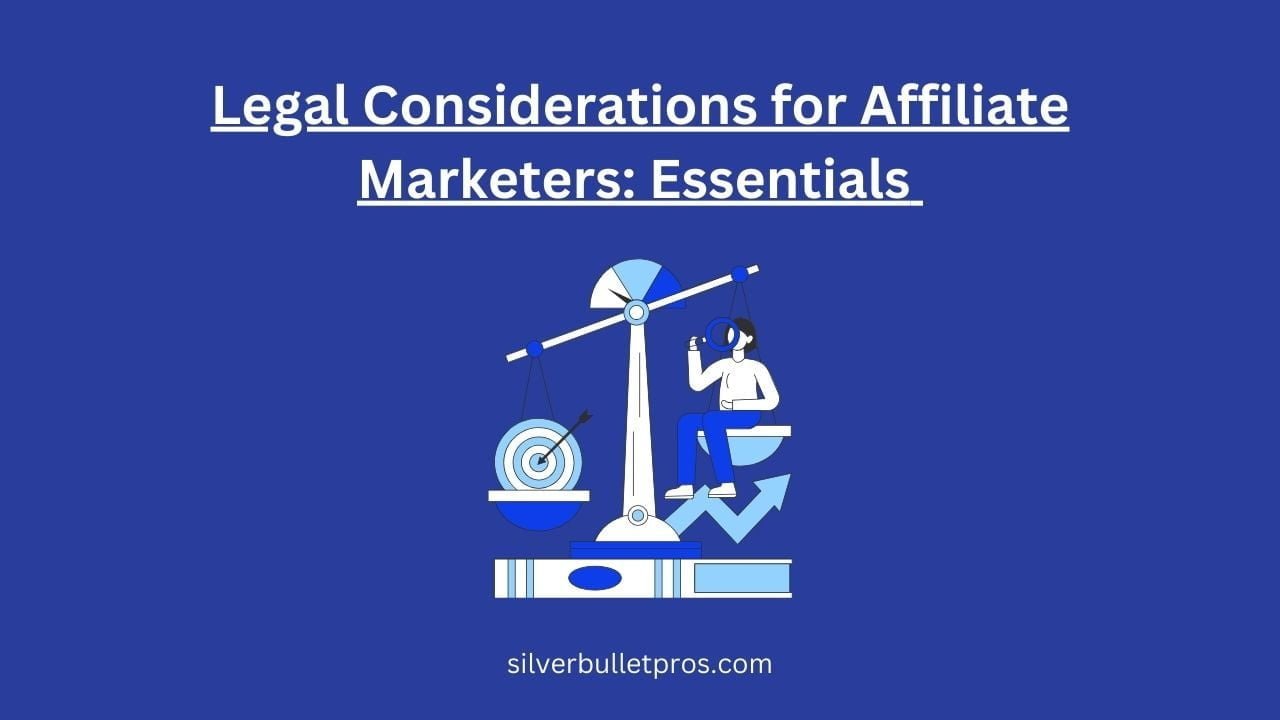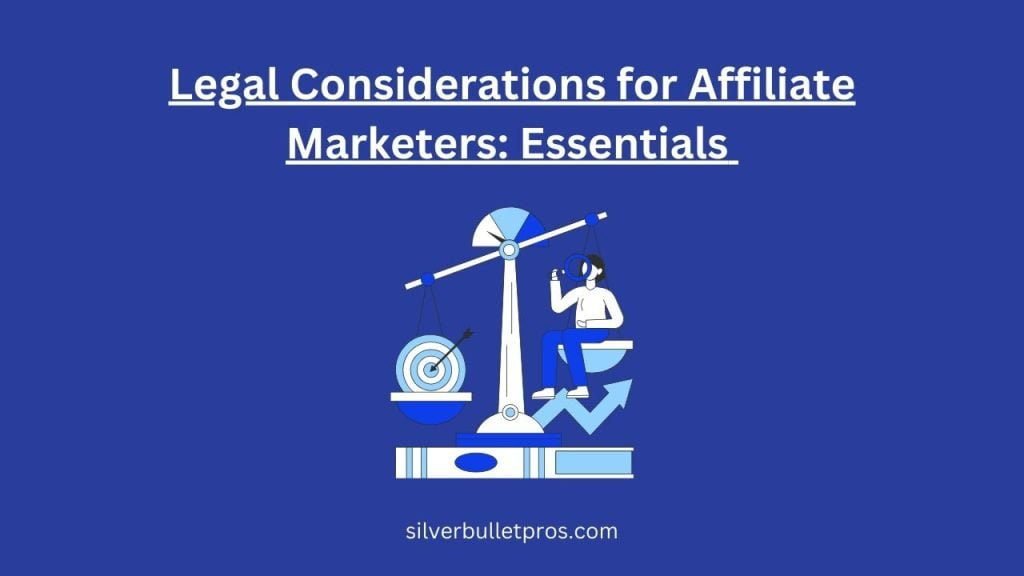

Affiliate marketing has become an increasingly popular way for individuals and businesses to earn revenue online. However, it's crucial for affiliate marketers to understand and comply with the relevant laws and regulations to avoid legal issues and protect themselves and their audience. This outline covers the essential legal considerations for affiliate marketers, including complying with affiliate marketing laws, using affiliate links properly, meeting disclaimer and disclosure obligations, protecting privacy and data, avoiding endangerment and false advertising, and understanding the tax implications of affiliate marketing.
Complying with affiliate marketing laws is paramount, as failure to do so can result in severe consequences. Key regulations include the FTC's guidelines on endorsements and testimonials, the CAN-SPAM Act governing commercial email, the GDPR and CCPA related to data privacy and protection. Affiliate marketers must use clear and unambiguous language in their disclosures and properly implement nofollow and sponsored links.
Protecting privacy and data is another critical aspect, with laws like COPPA and data security regulations to consider. Affiliate marketers must also be cautious about promoting potentially dangerous products or making false or misleading claims, as they can face liability for endangerment and false advertising.
The tax implications of affiliate marketing should not be overlooked, as affiliate marketers may need to comply with federal and state tax laws, and understand how often these laws change. Ultimately, complying with affiliate marketing laws is essential to avoid legal risks, maintain trust with the audience, and ensure the long-term success of an affiliate marketing business.
Complying with Affiliate Marketing Laws
FTC Regulations
Affiliate marketers must adhere to the Federal Trade Commission (FTC) guidelines, which mandate clear and conspicuous disclosures about the nature of affiliate relationships to avoid deceptive advertising practices.
CAN-SPAM Act
Marketers must comply with the CAN-SPAM Act, which sets rules for commercial email, establishes requirements for commercial messages, gives recipients the right to have emails stopped from being sent to them, and spells out tough penalties for violations.
GDPR
If you target or collect data from individuals in the European Union, you must comply with the General Data Protection Regulation (GDPR). This includes obtaining explicit consent before collecting personal data and ensuring data protection and privacy.
CCPA
The California Consumer Privacy Act (CCPA) provides California residents with rights regarding their personal data. Affiliate marketers must allow users to opt-out of the sale of their data and ensure transparency in data collection practices.
Using Affiliate Links Properly
Use Clear and Unambiguous Language
Ensure that any disclosures about affiliate links are straightforward and easy to understand. Ambiguity can lead to non-compliance with legal standards.
Using Nofollow and Sponsored Links
Properly attribute affiliate links using “nofollow” or “sponsored” tags to comply with search engine guidelines and avoid penalties.
Disclaimer and Disclosure Obligations
Marketers must include disclaimers and disclosures to inform their audience about the affiliate relationships and any compensation received. This transparency is crucial for maintaining trust and legal compliance.
Protecting Privacy and Data
1. COPPA and Online Privacy
The Children's Online Privacy Protection Act (COPPA) imposes certain requirements on websites or online services directed to children under 13 years of age, including obtaining verifiable parental consent before collecting personal information.
2. Data Security
Affiliate marketers must implement robust data security measures to protect consumer information from breaches and unauthorized access, adhering to relevant regulations such as GDPR and CCPA.
Avoiding Endangerment and False Advertising
1. Liability for Dangerous Products
Marketers can be held liable if they promote products that are dangerous or harmful. It is essential to conduct due diligence and avoid endorsing products that could pose a risk to consumers.
2. Puffery vs. False Statements
While puffery (exaggerated claims that no reasonable person would take literally) is generally permissible, making false or misleading statements about a product can lead to legal action.
Tax Implications of Affiliate Marketing
1. Federal Tax Laws
Affiliate income is subject to federal income tax. Marketers must report earnings accurately and pay any due taxes.
2. State Tax Laws
State tax obligations vary and can include income tax, sales tax, and other local taxes. It is crucial to understand the tax requirements in each state where you operate or have customers.
How Often Do Laws About Affiliate Marketing Change?
Laws and regulations can change frequently. Staying informed about updates in affiliate marketing laws and guidelines is essential for ongoing compliance.
Why Is It Important to Comply with Affiliate Marketing Laws?
Compliance ensures that marketers avoid legal penalties, maintain trust with their audience, and uphold the integrity of the marketing industry.
What Is the Worst Case for Endangerment and False Advertising for Affiliate Marketers?
The worst-case scenario includes facing significant fines, lawsuits, and potentially being barred from conducting business. False advertising and promoting dangerous products can also severely damage a marketer’s reputation.
Are There Tax Forms for Affiliate Marketers?
Yes, affiliate marketers typically need to fill out and submit various tax forms, such as the IRS Form 1099-MISC for reporting income. State-specific forms may also be required depending on where the marketer operates.
What are the key legal requirements for affiliate marketing disclosure?
The key legal requirement is to clearly disclose the affiliate relationship to consumers. This involves stating that the content contains affiliate links and that the marketer may receive compensation if the consumer makes a purchase.
How can affiliate marketers ensure compliance with advertising and consumer protection laws?
Affiliate marketers should familiarize themselves with relevant laws, use proper disclosures, avoid deceptive practices, and consult legal professionals if needed.
Are there any specific regulations around affiliate marketing in different countries or regions?
Yes, there can be specific regulations for affiliate marketing in different countries or regions. For example, the FTC in the US and the ASA in the UK have guidelines for affiliate marketing disclosures and practices.
What are the potential legal consequences of violating affiliate marketing laws and regulations?
Potential legal consequences include fines, cease and desist orders, lawsuits, and even criminal charges in severe cases of fraud or deception.
How can affiliate marketers protect themselves from legal risks associated with their activities?
Affiliate marketers can protect themselves by staying up-to-date with laws and regulations, using clear and conspicuous disclosures, avoiding deceptive practices, and consulting legal professionals when needed.